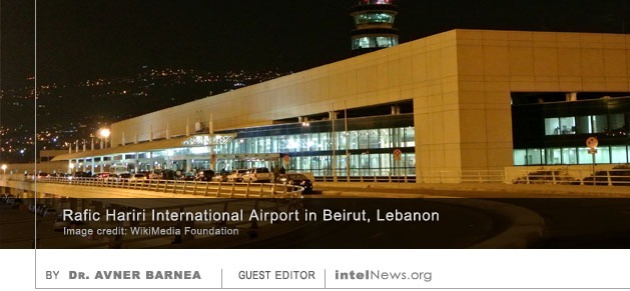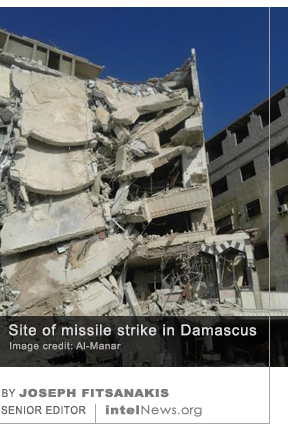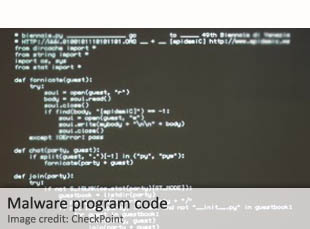Analysis: Killing of Hamas leader in Lebanon marks a new phase in Israel’s war
January 3, 2024 2 Comments
 MIDDLE EAST OBSERVERS WERE hardly surprised by yesterday’s news of the apparent assassination of Hamas leader Saleh al-Arouri in Lebanon. Not only was al-Arouri a senior Hamas official, but he also headed the militant group’s contact team with Lebanese Hezbollah and its Iranian patrons. He was likely at the top of Israel’s permanent assassination list even prior to Hamas’ bloody assault on Israel last October 7. Yet, within the explosive content of the ongoing Israel-Hamas war, Tuesday’s assassination signals the opening of a new and highly unpredictable phase in an already uncertain conflict.
MIDDLE EAST OBSERVERS WERE hardly surprised by yesterday’s news of the apparent assassination of Hamas leader Saleh al-Arouri in Lebanon. Not only was al-Arouri a senior Hamas official, but he also headed the militant group’s contact team with Lebanese Hezbollah and its Iranian patrons. He was likely at the top of Israel’s permanent assassination list even prior to Hamas’ bloody assault on Israel last October 7. Yet, within the explosive content of the ongoing Israel-Hamas war, Tuesday’s assassination signals the opening of a new and highly unpredictable phase in an already uncertain conflict.
The vague statements issued by Israeli officials in response to the news of al-Arouri’s assassination did little to dispel the broadly accepted view that Israel’s intelligence services were behind the killing. Headed by its external intelligence agency, the Mossad, Israel’s intelligence services have a long history of extrajudicial assassinations. In his seminal book Rise and Kill First, the Israeli investigative journalist Ronen Bergman discusses in detail the history of these assassinations, which predate the postwar establishment of the state of Israel. Bergman’s data-rich research reveals that the Israeli intelligence services have performed approximately 2,700 extrajudicial assassinations in their history —more than any Western state.
Given such a prolific history of targeted killings, al-Arouri’s assassination in Beirut can be described as both expected and unremarkable. Indeed, Israeli officials have stated repeatedly since October 7 that Hamas’ senior leadership will be targeted worldwide. In a leaked recording that emerged last month, Ronen Bar, director of the Israeli Security Agency, was heard announcing to members of Israel’s Knesset that Hamas’ senior leadership would be targeted “in Gaza, in the West Bank, in Lebanon, in Turkey, in Qatar, everywhere”.
At the time the recorded conversation leaked, nobody thought that Bar, a seasoned intelligence officer, was bluffing. Indeed, the operational capabilities and reach of the Mossad are well understood by everyone in the Middle East. That al-Arouri was assassinated in southern Beirut’s Dahiyeh suburb is significant. An undisputed Hezbollah stronghold, Dahiyeh is tightly controlled by the Shiite militant group, which prides itself on ensuring the safety of its residents.  Yesterday’s assassination at the very heart of Hezbollah’s lair was nothing short of a demonstration of the Mossad’s competency in special operations.
Yesterday’s assassination at the very heart of Hezbollah’s lair was nothing short of a demonstration of the Mossad’s competency in special operations.
If Israel is truly intent on neutralizing the leadership of Hamas, Mossad’s competency will be increasingly tested in the coming months, as the Jewish state will have to strike repeatedly beyond its borders. This is because, unlike the beleaguered Gazans, who are currently experiencing the most destructive bombing campaign of the 21st century, most leaders of Hamas live in relative luxury in Doha, Ankara, Beirut, Damascus, and other Middle Eastern metropolitan centers. It is there, and not in the razed neighborhoods of Khan Yunis and Jabalia, that Israeli assassination teams will need to operate with increasing dexterity. Read more of this post
 LAST WEEK, LEBANON’S GENERAL Security Directorate
LAST WEEK, LEBANON’S GENERAL Security Directorate 
 • State-level espionage on EU a ‘very high threat’ says report. The most successful attempts of espionage at a top EU institution are state sponsored, according to an
• State-level espionage on EU a ‘very high threat’ says report. The most successful attempts of espionage at a top EU institution are state sponsored, according to an  Yossi Cohen, the chief of the Mossad —Israel’s main external intelligence agency— said he has authorized “more than a few” assassinations during his tenure and warned that more may be on the way. Cohen, 57, who took command of the Mossad in 2016, spoke last week to Mishpacha, a magazine aimed at ultra-orthodox Jews. His comments were
Yossi Cohen, the chief of the Mossad —Israel’s main external intelligence agency— said he has authorized “more than a few” assassinations during his tenure and warned that more may be on the way. Cohen, 57, who took command of the Mossad in 2016, spoke last week to Mishpacha, a magazine aimed at ultra-orthodox Jews. His comments were  The government of Iran is smuggling parts for ballistic missiles to Lebanon, where they are secretly assembled in clandestine factories operated by the Shiite militant group Hezbollah, according to Israel’s former spy chief. For several months now, the international news agency Reuters has been
The government of Iran is smuggling parts for ballistic missiles to Lebanon, where they are secretly assembled in clandestine factories operated by the Shiite militant group Hezbollah, according to Israel’s former spy chief. For several months now, the international news agency Reuters has been  Officials in the Czech Republic have announced that the country’s spy agency headed an operation in several countries, aimed at neutralizing a cyberespionage network operated by the Lebanese militant group Hezbollah. Early last week, the Security Information Service (BIS), the primary domestic national intelligence agency of the Czech Republic, issued a short
Officials in the Czech Republic have announced that the country’s spy agency headed an operation in several countries, aimed at neutralizing a cyberespionage network operated by the Lebanese militant group Hezbollah. Early last week, the Security Information Service (BIS), the primary domestic national intelligence agency of the Czech Republic, issued a short  Brazilian police have announced the arrest of Assad Ahmad Barakat, a Lebanese national who is believed to be one of the most prolific international financiers for the Shiite group Hezbollah. Barakat was born in Lebanon but fled to Paraguay in the mid-1980s in the midst of Lebanon’s brutal civil war. He began an import-export business and eventually acquired Paraguayan citizenship. He gradually built a small business empire in Paraguay, which included engineering and construction, as well as transportation firms. Throughout that time, however, Barakat maintained strong connections with Hezbollah, the paramilitary group that has a strong following among Lebanon’s large Shiite Muslim community.
Brazilian police have announced the arrest of Assad Ahmad Barakat, a Lebanese national who is believed to be one of the most prolific international financiers for the Shiite group Hezbollah. Barakat was born in Lebanon but fled to Paraguay in the mid-1980s in the midst of Lebanon’s brutal civil war. He began an import-export business and eventually acquired Paraguayan citizenship. He gradually built a small business empire in Paraguay, which included engineering and construction, as well as transportation firms. Throughout that time, however, Barakat maintained strong connections with Hezbollah, the paramilitary group that has a strong following among Lebanon’s large Shiite Muslim community. A sophisticated spying device disguised as a rock, which was allegedly planted by Israeli intelligence, was found by Lebanese Army troops on a hill located a few miles from the Lebanese-Israeli border. The discovery was reported early on Saturday by several Lebanese news websites, including Al-Mayadeen and Al-Manar, which are closely affiliated with Hezbollah. Al-Manar
A sophisticated spying device disguised as a rock, which was allegedly planted by Israeli intelligence, was found by Lebanese Army troops on a hill located a few miles from the Lebanese-Israeli border. The discovery was reported early on Saturday by several Lebanese news websites, including Al-Mayadeen and Al-Manar, which are closely affiliated with Hezbollah. Al-Manar  Israel has refused comment following the death of a senior official of Lebanese militant group Hezbollah, who was killed on Saturday in a missile strike in Syria. Samir Kuntar (also spelled Qantar) was a Druze who joined the Syrian-backed, Lebanese-based, Palestine Liberation Front (later Popular Front for the Liberation of Palestine – General Command) at a young age. In 1979, Kuntar was jailed for an attack on an apartment block in Israel’s northern coastal town of Nahariya, which resulted in the death of four Israeli civilians and two of the attackers. However, he was freed after nearly three decades in prison in exchange for the bodies of two Israel Defense Force soldiers, who had been captured and executed by Hezbollah in 2006.
Israel has refused comment following the death of a senior official of Lebanese militant group Hezbollah, who was killed on Saturday in a missile strike in Syria. Samir Kuntar (also spelled Qantar) was a Druze who joined the Syrian-backed, Lebanese-based, Palestine Liberation Front (later Popular Front for the Liberation of Palestine – General Command) at a young age. In 1979, Kuntar was jailed for an attack on an apartment block in Israel’s northern coastal town of Nahariya, which resulted in the death of four Israeli civilians and two of the attackers. However, he was freed after nearly three decades in prison in exchange for the bodies of two Israel Defense Force soldiers, who had been captured and executed by Hezbollah in 2006. The recent attacks by Islamic State militants in Paris continue to dominate the world’s headlines. But the double suicide blasts that struck Beirut three days earlier are far more significant for the future of the Syrian Civil War. The outpouring of grief that followed the attacks of November 15 in the French capital prompted
The recent attacks by Islamic State militants in Paris continue to dominate the world’s headlines. But the double suicide blasts that struck Beirut three days earlier are far more significant for the future of the Syrian Civil War. The outpouring of grief that followed the attacks of November 15 in the French capital prompted  there, and even the Mossad, Israel’s feared spy service, rarely ventures in the Hezbollah-controlled neighborhoods.
there, and even the Mossad, Israel’s feared spy service, rarely ventures in the Hezbollah-controlled neighborhoods. Hundreds of ground troops from Iran and Lebanon have been entering Syria in the past two weeks and are about to launch a large-scale ground attack against rebel groups, according to Reuters. The news agency quoted Lebanese sources “familiar with political and military developments in the conflict”. One source said that the Russian airstrikes in Syria, which began earlier this week, are the first phase of a large-scale military offensive against the Islamic State and other anti-government forces operating on the ground.
Hundreds of ground troops from Iran and Lebanon have been entering Syria in the past two weeks and are about to launch a large-scale ground attack against rebel groups, according to Reuters. The news agency quoted Lebanese sources “familiar with political and military developments in the conflict”. One source said that the Russian airstrikes in Syria, which began earlier this week, are the first phase of a large-scale military offensive against the Islamic State and other anti-government forces operating on the ground. Israeli authorities have charged a Swedish citizen with working as an intelligence officer for the Lebanese militant group Hezbollah. It is believed that Hassan Khalil Hizran, 55, was born to Palestinian refugees in Lebanon, from where he emigrated to Sweden many years ago. But he was
Israeli authorities have charged a Swedish citizen with working as an intelligence officer for the Lebanese militant group Hezbollah. It is believed that Hassan Khalil Hizran, 55, was born to Palestinian refugees in Lebanon, from where he emigrated to Sweden many years ago. But he was  A team of officers from Israel’s Mossad intelligence agency were heading to Cyprus late yesterday to be briefed on the arrest of a dual Lebanese-Canadian citizen, who was found to be in possession of 67 thousand packages of ammonium nitrate. It is not yet clear whether the passports held by the 26-year-old man are genuine. Cypriot police said he used his Canadian passport to enter the Mediterranean island about a week ago. But he was
A team of officers from Israel’s Mossad intelligence agency were heading to Cyprus late yesterday to be briefed on the arrest of a dual Lebanese-Canadian citizen, who was found to be in possession of 67 thousand packages of ammonium nitrate. It is not yet clear whether the passports held by the 26-year-old man are genuine. Cypriot police said he used his Canadian passport to enter the Mediterranean island about a week ago. But he was 






